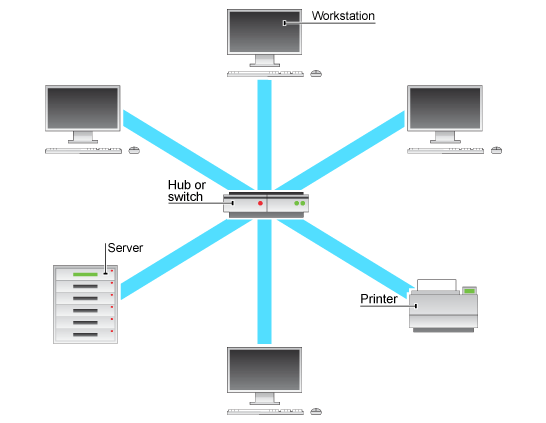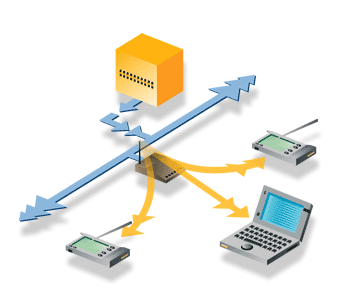-It is the interconnection of two or more computers.
-The collection of two or more computers, as well as other related devices, connected together so that information can be exchanged between among them.

ADVANTAGES OF
COMPUTER NETWORKING
- Reduce costs- Everyone in your home or office can share a single printer and a single high-speed Internet connection at the same time.
- Increased efficiency- You can access data, pictures and many other files on any connected computer without having to save them into a USB flash drive or burning them in a CD.
- Economical- Purchasing software network licenses (Perpetual License) is relatively cheaper than purchasing individual licenses.
- More productivity- Shared internet access means to be one needs to wait to use the internet or email. Everyone can work simultaneously.
- Increased access to communication channels- You can communicate with others in the network using the email or an Instant Messaging (IM) Software (Messenger,Gmail,Yahoo and etc.)
- More efficient patching of Software- Software updates need only be installed once.
Patch- a piece of software designed to fix or update the data of a computer program.
- Network failure- Some of the organizations activities depend on the network to be up and running. If the network fails, the users lose access to information and the ability to communicate electronically.
- Server error- In a server/client relationship network, server faults may prevent you from using some applications, or even from accessing your computer.
- Hacker prone/Prone to hacker- Your system is open to hackers, especially if it is connected to Internet at all time.
- Prone to virus- Networks are vulnerable to virus attacks. The example of this is the I Love You Virus.
Virus- introduced one workstation can spread quickly to other workstaions.
- it is also example of computer program
- it is also example of computer program
Two types of Virus
- File Virus- Virus for files.
- Boot Virus- Virus for the system itself.
- Location/ Distance problems- Resources, such as printers, might be located too far from your table.
NETWORK MEDIA TYPES
- The most efficient and practical method of networking where computers are connected with cables and typically used at the network core and inner connect servers and network equipment.
2. Wireless Network
- Quickly becoming the connection option of choice as it does not require any cable to set in your home.
2. Wireless Network
- Quickly becoming the connection option of choice as it does not require any cable to set in your home.

1. Personal Area Network (PAN)
-A computer network used to interconnect devices centered on an individual workplace.
Interconnection: Home Network
Ownership of Network: Private
Design and maintenance: Easy
Speed: High
Congestion: Less
Devices used for transmission of data:USB cable, bluetooth, infrared.
2. Local Area Network (LAN)
- A network that connects a group of computers in a small geographical area.

Distance range: Up to 100 meters
Interconnection: Room to room, building to building
Ownership of Network: Private
Design and maintenance: Easy
Speed: High
- It covers relatively large region such as cities, towns, or municipalities.
Devices used for transmission of data:USB cable, bluetooth, infrared.
2. Local Area Network (LAN)
- A network that connects a group of computers in a small geographical area.

Distance range: Up to 100 meters
Interconnection: Room to room, building to building
Ownership of Network: Private
Design and maintenance: Easy
Speed: High
Congestion: Less
Devices used for transmission of data:WiFi, Ethernet Cables
Devices used for transmission of data:WiFi, Ethernet Cables
3. Metropolitan Area Network (MAN)
- It covers relatively large region such as cities, towns, or municipalities.
 Distance range: 5 to 50 kilometers
Distance range: 5 to 50 kilometers
Interconnection: City to city
Ownership of Network: Private or Public
Design and maintenance: Difficult
Speed: Moderate
Congestion: More
Devices used for transmission of data: Modem, copper cable/fiber optic
4. Wide Area Network (WAN)
Devices used for transmission of data: Modem, copper cable/fiber optic
4. Wide Area Network (WAN)




No comments:
Post a Comment